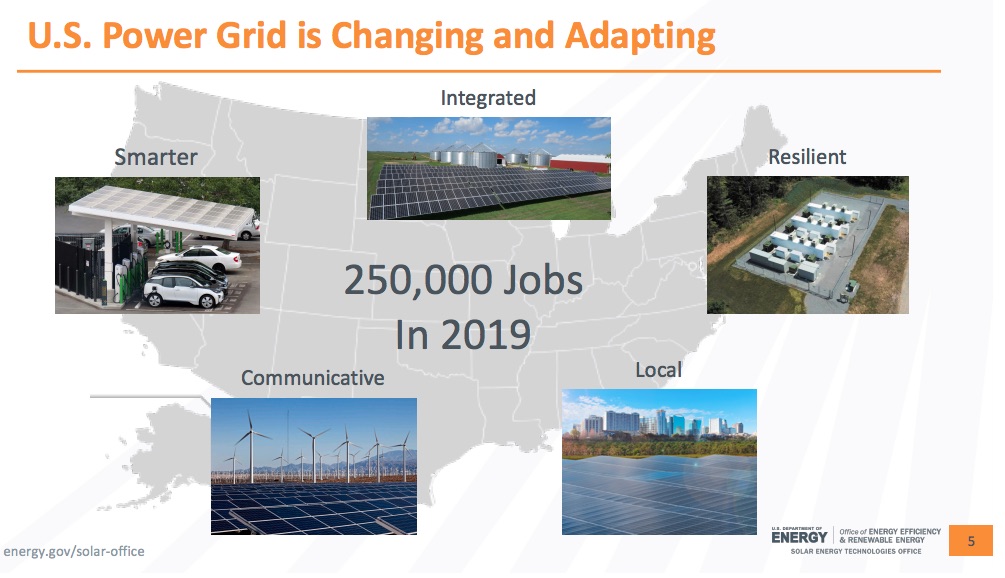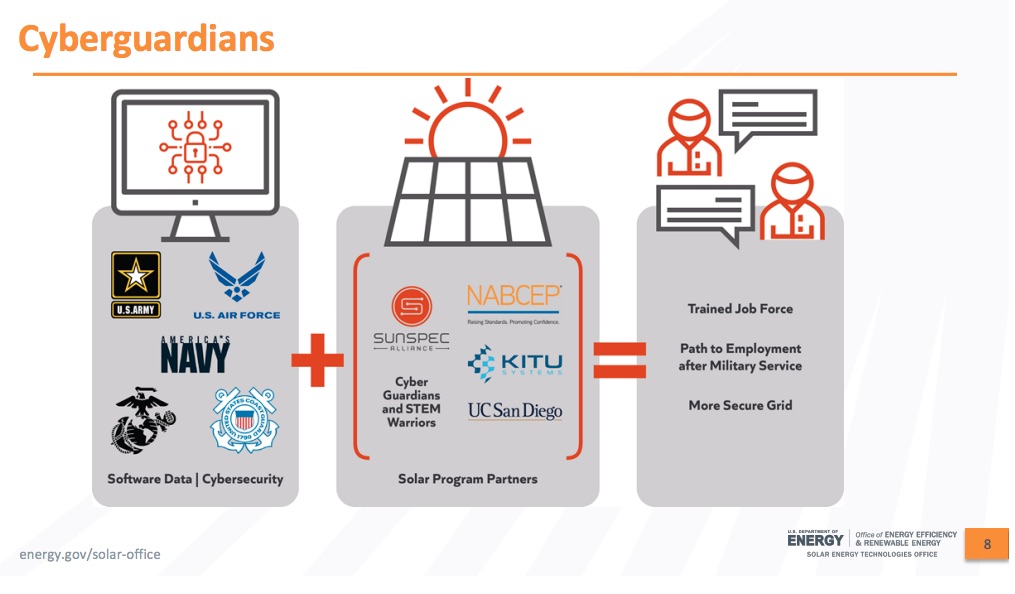SunSpec, the leading organization developing standards in the Solar industry, has launched an initiative aiming to train folks for jobs in the distributed energy resource (DER) sphere. Thanks to the decreasing cost of renewable energy systems, DER’s installation is apparently still increasing. Thanks to Internet-of-Things technology, renewable energy systems are increasingly easy to control remotely and orchestrate based on energy grid needs. That in turn requires workers who understand energy systems, and are computer literate enough to handle designing, installing, configuring, and maintaining modern DER equipment.
That’s what SunSpec hopes to achieve with its Cyberguardians program. To build a multi-year training program giving folks the skills necessary to build the 21st century energy grid.
As Tom Tansy, CEO of SunSpec said, “A more intelligent grid is a more resilient grid“. This means that when energy system resources, like solar arrays or energy storage units, can be remotely monitored (for conditions) and remotely controlled (to respond to conditions), then renewable energy resources can play an important role in ensuring electricity grid reliability.
The Cyberguardians program is a three-year training program organized in collaboration with two Universities (one is UC San Diego). It offers 27 academic units of course-work aimed at skills development related to electrical systems, distributed computer control systems, renewable electricity, and more. It is explicitly tailored to the needs of military veterans, the classes are taught online, and is available under the GI Bill.

The course of study has three tracks – Engineering, Operational, and Vocational. The engineering track focuses on those who design the equipment used in distributed energy systems. The operational track focuses on those designing the installed systems, and overseeing their maintenance. The operational track focuses on those doing the work in the field, to understand how to install and commission the equipment.
Modern renewable energy equipment is rapidly becoming computerized. The related standards – primarily IEEE1547 – now require data communications capability. That communication is two-way, including status data to a central server as well as receiving commands from the central server. That means designing the installed systems, as well as the grunt work of installing the systems, requires everyone understands not only the communications system, but how these devices interact with the electrical grid.
A critical part of this effort is cybersecurity. Recent years have shown an increasing number of cyber-attacks on electrical grid resources at utility companies and elsewhere. As renewable energy systems play a bigger role in the electricity grid, those miscreants will target those systems as well.
For several years now SunSpec has led a working group (jointly with Sandia National Labs) focused on cybersecurity needs of the distributed control system being designed for renewable energy systems. That effort brought together cybersecurity experts from across the computer industry to bake security requirements into the relevant standards.
That cybersecurity learning will also be part of the Cyberguardians training program.

And, yes, there are jobs aplenty in this sector. According to the National Solar Jobs Census![]() , by 2019 there were over 250,000 jobs in the USA in the solar industry. The primary job area is related to Installation and Project Development. Plus, the industry is growing rapidly.
, by 2019 there were over 250,000 jobs in the USA in the solar industry. The primary job area is related to Installation and Project Development. Plus, the industry is growing rapidly.
Therefore this is an industry badly needing trained workers. Lack of “experience, training or technical knowledge” is given as a primary cause making it hard to fill jobs in this industry.
The Cyberguardians project is supported by Dept of Energy grants but is intended to become a self-sustaining program over time. It has partnerships with:
- All branches of the US Military
- NABCEP – the national board for certification of renewable energy professionals
- Kitu Systems – a leading provider of software for renewable energy systems
- UC San Diego and other educatonal institutions
- A group of advisors from around the renewable energy industry
The training program is expected to launch in the summer of 2020.
It wasn’t clear from the presentation whether non-Veterans could sign up for this program. A query sent to SunSpec has gone unanswered.
- The USA should delete Musk from power, Instead of deleting whole agencies as he demands - February 14, 2025
- Elon Musk, fiduciary duties, his six companies PLUS his political activities - February 10, 2025
- Is there enough Grid Capacity for Hydrogen Fuel Cell or Battery Electric cars? - April 23, 2023
- Is Tesla finagling to grab federal NEVI dollars for Supercharger network? - November 15, 2022
- Tesla announces the North American Charging Standard charging connector - November 11, 2022
- Lightning Motorcycles adopts Silicon battery, 5 minute charge time gives 135 miles range - November 9, 2022
- Tesla Autopilot under US Dept of Transportation scrutiny - June 13, 2022
- Spectacular CNG bus fire misrepresented as EV bus fire - April 21, 2022
- Moldova, Ukraine, Georgia, Russia, and the European Energy Crisis - December 21, 2021
- Li-Bridge leading the USA across lithium battery chasm - October 29, 2021


















Thank you for this interesting, important, and hopeful article.
Thank you very, very much for not writing a damn word about coronavirus.